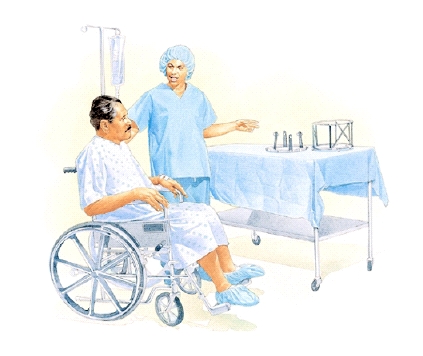Biopsy for a Brain Tumor
If the patient is a child, describe what you think he or she will experience before and after surgery. Check with the preadmission department at your hospital for resources that might help.
Your doctor may decide that you need to have a biopsy. The tumor sample taken during biopsy can show if the tumor is benign or malignant. This will help decide what treatment is needed. Read this sheet to learn more about the two types of biopsies available.

A head frame helps your surgeon map the site of the tumor.
Stereotactic Biopsy
Stereotactic biopsy is often used if a tumor is in a part of the brain that is hard to reach. A special frame may be used to hold the head in place. The biopsy is guided by CT or MRI scans.
Before the Procedure
Before the biopsy, part of your head may be shaved. You will have anesthesia to numb the part of your head where the surgeon will work. Most patients remain awake during the biopsy.
During the Procedure
During a stereotactic biopsy, the surgeon will pass a hollow needle through the skull bone into the tumor. Cells taken from the tumor will then be sent to a lab to be examined.
Risks and complications of stereotactic biopsy include bleeding, seizures, and infection.
Open Biopsy
A craniotomy allows an open biopsy to be done and as much of the tumor as possible to be removed. During the procedure, the scalp is cut and a piece of skull bone is taken out. This provides access to the brain. In most cases, the bone is put back in place.
Before the Procedure
A few days before the procedure you will have an exam, meet with your surgeon and sign consent forms. You will learn if you can take your usual medications before surgery and be told to avoid eating and drinking for at least 8 hours before surgery.
Planning the Return Home
As with any surgery, you may need some help when you return home. Plan ahead. Have people in mind to:
-
Drive you home from the hospital and to appointments
-
Keep track of doctors' instructions
-
Cook and take care of your house
-
Help manage bills












